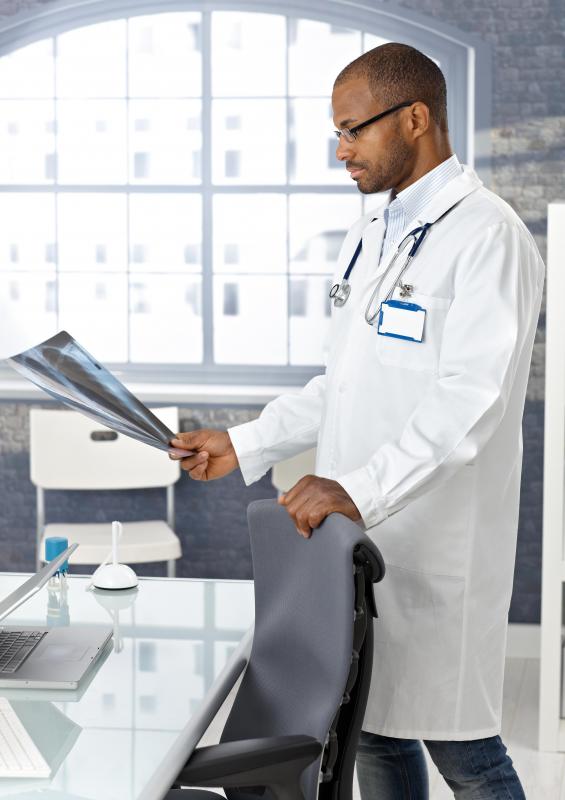At WiseGEEK, we're committed to delivering accurate, trustworthy information. Our expert-authored content is rigorously fact-checked and sourced from credible authorities. Discover how we uphold the highest standards in providing you with reliable knowledge.
What is a Herniated Intervertebral Disk?
When a person suffers from severe back pain, it can often be caused by a herniated intervertebral disk. A herniated intervertebral disk is a disk within the vertebrae that has degenerated. The spine is comprised of 33 vertebrae, each divided by these important disks.
The core of each disk possesses a jelly-like substance that helps the body to sustain weight and absorb shock as it bends and twists. When a person ages, the disks begin to deteriorate, losing their suppleness. As a result, a disc can prolapse, meaning some of the soft core can leak out.

When the soft core of the disks are squeezed out, less cushion exists among the disks of the vertebrae. This, in turn, can cause neck pain, back pain, nerve pressure, numbness, and sharp pain in the legs. Eventually, the spine will lose stability and bone spurs will form. A herniated disk can occur in both the lumbar spine (lower back) and the cervical spine (neck).

Whether the disks deteriorate because of age or back strain, a person with a herniated disk can experience a great deal of discomfort. When a person suffers from this condition, the pain is usually worse when he or she is actively moving. If the person is resting, the pain decreases. On the other hand, if the person bends forward, coughs, sneezes, sits, drives a car, or performs some similar action, the pain will increase. If a doctor suspects that a patient has a herniated intervertebral disk, he or she will order x-rays, an MRI, or a CT scan for the patient in order to have a visual idea of what is occurring within the patient's body.

When a physician determines that a patient is suffering from a herniated intervertebral disk, the physician will often prescribe medication for the pain. The physician will also prescribe bed rest for a couple of days if the patient has chronic or severe pain. Visiting a chiropractor in order to stretch the spine is another way to bring about pain relief.

Physicians or chiropractors may also prescribe stretching exercises that the patient can perform at home. Finally, the doctor may encourage the patient to lose weight, as this can help to relieve pain associated with a herniated intervertebral disk. It takes about four weeks for a person with a herniated disk to feel better. If a patient is still suffering from pain after four to six weeks have passed, the physician may recommend surgery to correct the problem.
AS FEATURED ON:
AS FEATURED ON:

















Discussion Comments
Unfortunately a herniated disc often shows up with very few symptoms. I had a friend who just had mild back pain, and she thought maybe she had just tired the muscles or strained them or something.
But eventually she developed sciatica, which is when the nerves in your back become inflamed.
She might not have been able to prevent this by knowing she had a herniated disc but it probably would have helped.
On the other hand back pain is so common, it doesn't make sense to go to the doctor for every little bit. It's hard to find a balance for it.
I didn't realize it for a while but a "slipped disk" and a herniated disk are the same thing, even though saying a disk has slipped is really inaccurate.
I guess I can see why people would call it that, and the term has probably been around for a while.
Because if you feel a little lump near the spine and it hurts so much, you might think it is because a disk had slipped out of place in the spine.
That can lead to people doing stupid things though, like trying to fix the slipped disk by jerking it back into place.
I can't imagine that would do much for the poor person suffering from this, and would probably hurt it even more.
Language is so important when it comes to things like this.
Post your comments